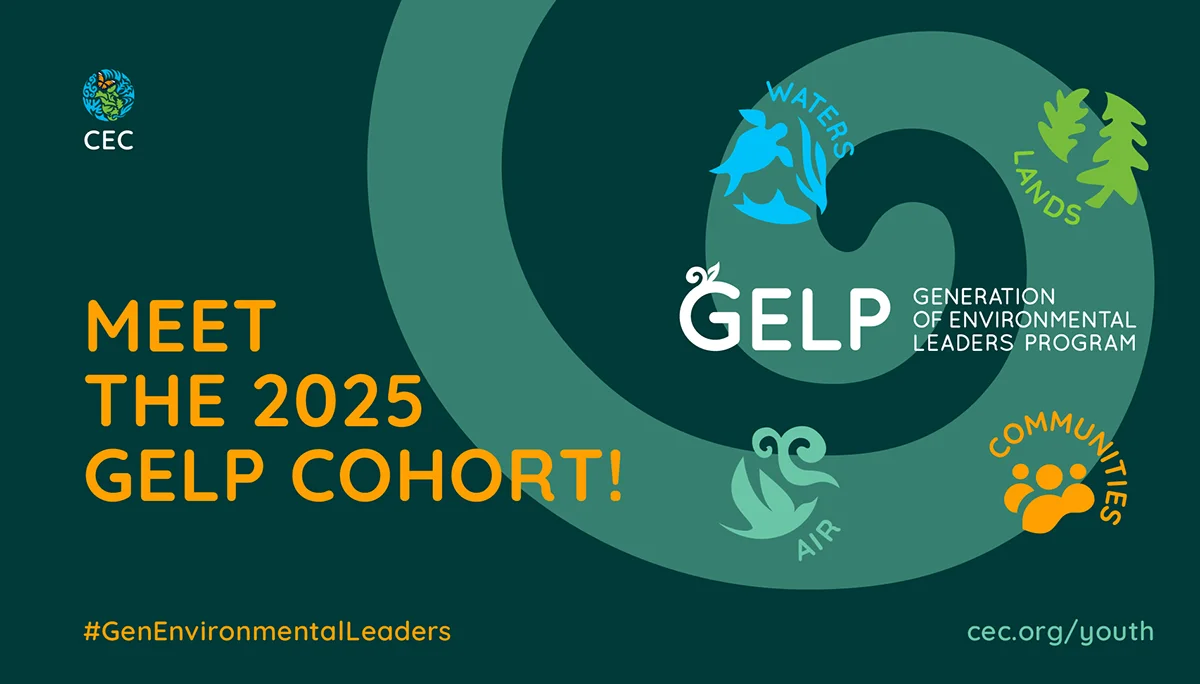CEC Announces Second Cohort of Generation of Environmental Leaders Program (GELP)
Tiohtià:ke (Montreal), 3 July 2025 — The Commission for Environmental Cooperation (CEC) is thrilled to announce the second cohort of the Generation of Environmental Leaders Program (GELP)!
The 2025 GELP cohort comprises three teams, one each from Canada, Mexico and the United States, selected for their creative and impactful solutions to support North American communities and preserve our shared waters, lands and air.
The GELP offers more than just a platform for ideas; it includes a year of mentorship, training in public speaking, marketing and project management, guidance from experts, and several networking opportunities. Each selected youth team also receives C$15,000 in seed funding to amplify the impact of their solutions in local communities.
“We’re proud to welcome the second GELP cohort. Over the past year, it’s been inspiring to work alongside these teams of youth who have worked to transform bold ideas into real-world action, tackling urgent social and environmental challenges across North America. We’re excited to see the impact this new cohort will make; their solutions are already driving positive change in their communities and for our shared environment,” said Julie Amina Jacquemin, CEC’s Outreach, Partnerships and Youth Engagement Lead.
The selected teams and their solutions are:
• Canada:
“RegEnergy: Solar energy for regenerative farms” promotes regenerative agriculture by installing solar panels on small, women-run farms in Canada. The initiative reduces costs, supports food sovereignty and creates green jobs, while showcasing solar energy’s potential through public events and educational materials. RegEnergy helps climate finance flow toward tangible, low-carbon infrastructure that benefits communities—not just profit margins. This work is part of a growing shift in how we define value, investment and resilience in a warming world.
• Mexico:
“Rescuing Isla Basura: Environmental Restoration and Circular Economy” focuses on preventing marine pollution by recovering, transforming and repurposing both organic and inorganic waste. The team works in close collaboration with the “Playa Sur Fishermen’s Union,” promoting sustainable infrastructure and a regenerative Circular Economy to strengthen the resilience of coastal communities.
• United States:
"Youth-Led Food Waste Solutions: Driving Demand for US Infrastructure and the Green Economy" tackles the food waste problem in US public schools by offering a low-cost, student-led composting program. Designed to overcome financial and infrastructure barriers, Let’s Go Compost trains students and staff, integrates composting into school operations and partners with local facilities. The program fosters environmental education and reduces landfill waste while supporting long-term sustainability without ongoing reliance on external funding.
Click here to learn more about the 2025 GELP cohort and their solutions.
The 2025 GELP cohort will present their solutions to North America’s top environmental officials during the CEC’s annual Council Session and JPAC Public Forum, taking place 24–25 July 2025 in Mexico City. The event is open to the public and will be livestreamed: join us to witness their innovative ideas in action!
To learn more about CEC youth initiatives and how to connect with a growing network of young environmental leaders, please visit the Youth Engagement section on our website.
Stay updated by following us on social media and using the hashtags #ActNow, #GELP and #CEC32 to join the conversation. You can sign up for our newsletter to learn more about our initiatives, opportunities and efforts.
